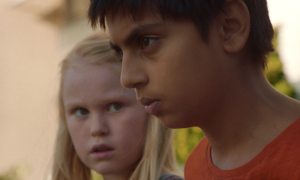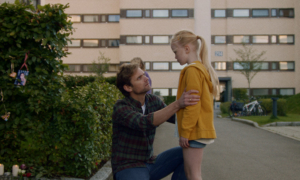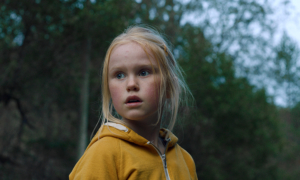From Eskil Vogt, writer of Academy and BAFTA-nominated The Worst Person in the World, comes a new psychological horror that’s not for the feint-hearted, The Innocents.
Set during a bright Nordic summer, The Innocents tells the story of four children living in the same housing estate, who, when left to their own devices, reveal their dark and mysterious powers. But when the adults aren’t looking, playtime takes a dangerous turn.
We spoke to Vogt about being inspired by his own childhood, what it was like working with child actors and why he didn’t want to hold back on the horror…
Can you remember when you first got the idea for The Innocents?
The idea first came when I was working with my friend [The Worst Person in the World director] Joachim Trier. We decided that we wanted to make a movie that was more supernatural. We were brainstorming and it became a movie called Thelma, which he made a few years ago.
However, during the first brainstorming process, I came up with the idea of ‘what if a group of kids were playing together and when they were playing something magical would happen?’ They would just go along with it, like it’s nothing and they would go home, sit down in front of the television, at the dinner table and then that magic was gone and we would say ‘oh that was just their imagination’.
But I thought maybe it would be interesting if you make a movie where that was real. And Joachim, my co-writer, just didn’t respond to it. So we just left that. Which we do, you know, no hard feelings. A million ideas just die in the writing room like that! Then we did something else but then it came back to me, which is very rare. Usually, they just lie there afterwards. I think it was because I was a father that I’d become curious about childhood again. I really wanted to make a movie about that secret world of childhood.
Did you look to your own children or your own childhood when writing the movie?
Yes, when I started to work on the idea I, of course, observed my children, as I do. But the thing is they can’t really tell me that much! [haha] So, I’d watch them and then suddenly they would trigger a memory in me of being a child. Suddenly I would feel what I felt being a kid just for a fraction of a second. It’s so different, being an adult, you don’t have the same concepts. You don’t experience the world in the same way. But I would get the whiff of it and be reminded of how different it was. Then I would start to try to remember as much as I could of my own childhood as part of the preparation.
Quite quickly I remembered some of those little unpleasant memories. I talked to other people, and there were so many people who had those memories of testing limits, experimenting, of being a bit cruel to animals, to other kids, to younger siblings… I don’t have any, I am one, but I know a lot of younger siblings have been subjugated to a lot of stuff from their jealous older siblings.
So I just felt there was something there as well. There wasn’t only this magic of childhood, where you feel stuff so intensely and have this amazing imagination. There’s also something else there where you are testing your limits. You’re trying to find your own set of values and morals. You’re doing stuff you regret, and then you feel bad and then you sort of understand what you should do and shouldn’t do.

What was the appeal on focussing the story on children?
For me it is a movie about childhood. There are so many films and series about young people with supernatural powers. When I started to talk about it to my producer, I suddenly realised ‘oh, am I making one of those?’. Because that’s what everyone is doing. I sort of panicked, but I had this intuition that this could be something a little bit different.
I think one of the reasons was that most of those other series or movies are about puberty, that transition of becoming an adult where your body suddenly changes and your hormones run amok. They were very much about that time in life. But my movie is about childhood. I knew the break of age will be 11. These main kids can’t even be tweens because then that’s another set of themes that will enter and my movie was that original idea about that magical time of childhood.
This movie goes against the trope of adults vs children – the children are both heroes and villains. Why did you decide to go down that route?
A lot of movies about kids are about adults looking at kids. A lot of the ‘scary kid’ movies are about adults looking at the kid and being like ‘is he possessed by the devil or by a demon or what’s happening here?’ So you are actually with the adults, it’s not about the kids and I knew I wanted a movie where I was in their inner circle. I was with the kids. I understood the kids. I serve the kids from the inside, not from the outside looking in. So the adults are just in the background walking past, not really realising what was happening…

All of the main characters in The Innocents are children. What was the casting process like to find them?
I tried to not let myself be constrained in my writing by thinking of practical problems. I kind of wrote myself into a corner with four young kids and a cat. That was the big challenge! Me and my producer talked about that and were like ‘okay, this movie will be bad if just one of the four kids weren’t top notch’.
They had to be good. Not like children’s movie good, but a movie for adults good.
So we used a lot of time and a lot of our budget finding the right kids and being very open. And not having this preconceived idea of what they should look like. Just find the most interesting kids we could and then see if they could fit the characters or we can make the character fit what they had to offer.
So we changed the sex of the two girls, who were two brothers in the script and for the two others, we changed their ethnicity because we found these amazing four kids and thought ‘okay, we need to make it work around them’. Then we started to cast the adults after that, which is the opposite of what you usually do, which is the reason why you see so much bad child acting. You try to cast someone that looks like a younger version of that character or their mother who’s a famous actress, and she’s already cast and that means they need to look like that. Then you have to choose from a very narrow selection.
We chose from everyone. We tried to see everyone. Then we also spent a little time with them and got to know them and worked with them. We taught them the basics of acting through workshops. We tried to put everything in place so they would feel relaxed around each other and be allies during the whole shoot, even though there was a four-year age gap between the youngest who was seven and the oldest who had just turned 11 when we started shooting. But they’re still friends now after the shoot, which is nice.
What was it like working with the children during the shooting process?
They would know everything! My rule was: no surprises. Sometimes with children, even with older actors, some directors like to create real surprises so they get real surprises or shock. I thought that I might get a good moment but the next day the poor kid would come on set and go ‘where’s the next shock?’ Then no one could do any good work consistently under those conditions. So they would be very well prepared and they would trust us.
Then we would over-prepare some of those scenes we thought would be potentially traumatic and difficult because they were violent or had some extreme emotions. And it turned out that most of those scenes were the most fun they have on set! They just loved that!
One of the reasons why they’re such good actors is that they probably did even more role-playing than other kids, so they can understand completely the difference between fiction and reality, and their character and themselves. Even the seven-year-old who plays Aisha was asking me questions about ‘what’s my character’s motivation here?’
So it felt like working with real collaborators and we made sure that they would feel safe on set. That they could bail on anything at any time without any hard feelings. But they were just so professional and hardworking.

There are some pretty harrowing scenes in the movie! Was it important for you not to hold back during some of those traumatic scenes?
Yeah, I think so. There’s some value in not holding back sometimes where other people hold back because at least it’s original to go places where other people don’t.
But in this movie, it was so important that it was a moral tale about transgression, and there are violent scenes where one kid finds her moral limit. Where she won’t go any further and another one will go further. That’s part of the plot and the themes, and I felt we had to go that far for the movie to explore its themes completely.
Also, what I like about horror films is that they are so sensual, that they get your body involved.
A horror movie can be a lot of stuff. It can be drama, thriller, or whatever. A pure thriller will be more intellectual but a horror movie will also get your body to react. I feel also that sometimes to do that, you have to show something, or make people believe you’re showing something that they wouldn’t expect to see, or feel.
They know the moviemakers are capable of taking you there, which I think is an interesting thing. There are some movies where you’ll never see the monster. They’ll stay in ‘good taste’ all the way, so you’re not that threatened. Sometimes in really cheap movies, you can get much more visceral effects because they don’t have that good taste.
Sorry, that came out wrong. I hope my movie has good taste [haha]! I just feel that there’s a value in transgressing.
It’s not all supernatural. The main characters have some real-world issues at home too. Why did you decide to add these elements into the movie?
I need to relate to my characters and their psychology and understand that. Sometimes when I’m writing I feel this will probably sway too much into the drama to be a pure horror movie, and maybe the horror fans won’t accept this as a horror movie. But I just think ‘well, it interests me, this is what I would like to see. So then probably someone else will find it interesting as well’.
At the other end, when you show it at a horror festival, the audience is usually so open to anything so we got the thumbs up in our festivals. It is a horror movie!
For me, it’s important that the performances are good and the characters feel real and you get that connection to them and understand them and their environment.

What do you want for audiences to take away from the movie by the end?
Well, first I love that apparently people have that visceral experience that a movie can have. You go to a movie theatre and in two hours you feel a lot of different emotions, you’re just taken through so many intense feelings and situations.
What I love is when people come up to me after the movie, and some are provoked by this or some are touched by that, or they start talking about the movie and after a minute or two, they’ll talk about their own childhood. I love that.
I feel if people watch my movie and after that experience of watching something that’s hopefully exciting and scary and even touching, they will start to think about their own childhood or they would have remembered something from their childhood that they hadn’t thought about in a long time.
I feel that’s a wonderful thing if they can take that away from it.
